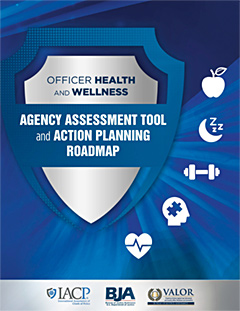Law enforcement
Collaborative Crisis Response Training Program FY 2021 Solicitation Webinar
See the YouTube Terms of Service and Google Privacy Policy
Officer Health and Wellness Agency Assessment Tool and Action Planning Roadmap Released
The International Association of Chiefs of Police (IACP), in partnership with the Bureau of Justice Assistance (BJA), has released Officer Health and Wellness Agency Assessment Tool and Action Planning Roadmap.
A comprehensive strategy to promote officer safety and wellness requires a multi-faceted approach addressing a variety of essential topics. The information contained in this resource is intended to serve as a guide for law enforcement...


